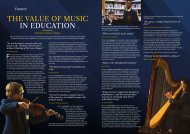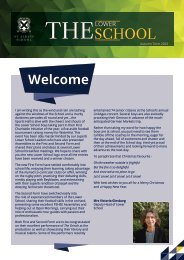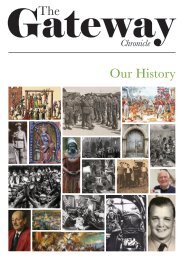Create successful ePaper yourself
Turn your PDF publications into a flip-book with our unique Google optimized e-Paper software.
Mathematics and Economics<br />
67<br />
<strong>The</strong> history of numbers and<br />
their development into modern<br />
mathematics<br />
Al-Khwarizmi<br />
W<br />
hat are numbers? <strong>The</strong>y are<br />
many things but are, first and<br />
foremost, a way of clearly expressing<br />
the world around us. <strong>The</strong>y, unlike<br />
words, are unambiguous, and one of<br />
the most fascinating things about numbers<br />
is that<br />
they are<br />
thousands<br />
of<br />
years<br />
old - ten<br />
thousand<br />
to<br />
be precise.<br />
Roughly<br />
at the<br />
dawn of<br />
the Neolithic<br />
age, in<br />
what is<br />
now the<br />
Czech<br />
Republic,<br />
numbers<br />
made<br />
their<br />
first recorded<br />
appearance in the form of the<br />
humble counting stick. <strong>The</strong> counting stick<br />
in question was a wolf bone, with notches<br />
carved into it in groups of five (why five?<br />
Work it out on your fingers…). This may<br />
not sound like the birth of maths as we<br />
know it today, with all of our chaos theories<br />
and non-Euclidian geometry but, at a<br />
time when life was short and brutal, this<br />
was a major intellectual achievement.<br />
Unfortunately, this was the extent of<br />
mathematical and numerical progress for<br />
the next 6000 years. <strong>The</strong> next stop on the<br />
mathematical timeline is in Babylonia. <strong>The</strong><br />
expansion of trade powered the development<br />
of mathematics greatly, as with<br />
goods also moved ideas, hand in hand.<br />
This was particularly evident in Babylonia,<br />
which lay in what is now Southern<br />
Iraq. It sat on a crossroads of two major<br />
trade routes, running east to west, so it<br />
was somewhat inevitable that this vital<br />
economic region would see a certain degree<br />
of development in ideas, namely<br />
mathematical. It was here that the most<br />
primitive algebra was developed, along<br />
with something a little more important:<br />
Base 60. Base 60 was the unreliable counting<br />
system used by the Babylonians.<br />
Whilst it wasn’t reliable for counting, it<br />
paved the way for much more significant<br />
counting systems such as base 10 (denary<br />
counting system), which we use to count<br />
with today, and even binary – something<br />
used heavily in computers. Furthermore,<br />
Base 60 lives on today in the way we<br />
reckon time, with 60 seconds to the minute<br />
and 60 minutes to the hour. Despite<br />
the unreliability of base 60 to count with,<br />
clearly the Babylonians did something<br />
right after all!<br />
Just over a thousand years down the timeline,<br />
we see another very significant mathematical<br />
breakthrough – but this time in<br />
India. 900 B.C marks the birthday of perhaps<br />
the most important mathematical<br />
figure in existence – zero. Muhammad ibn<br />
Musa al-Khwarizmi came up with a term<br />
to finally embody the already ubiquitous<br />
idea of having nothing of something.


















